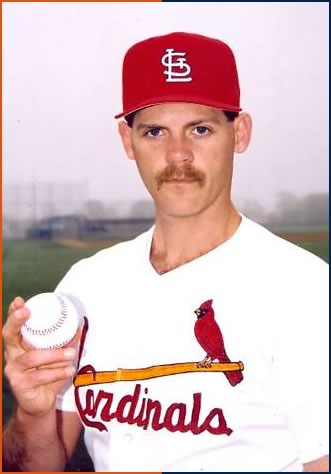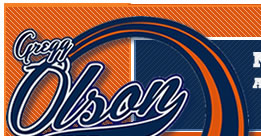INTERVIEW WITH GREGG OLSON
After graciously accepting to lend his name to the new Breakout Player of the Year honor, Gregg chatted with Nick Herfordt of College Baseball Lineup about his days at Auburn, his breakout sophomore season and his famous "Uncle Charlie" curveball which earned him the American League Rookie of the Year and made him a Major League All Star.
 COLLEGE BASEBALL LINEUP (CBLINEUP): After a high school pitching career which included a 27-0 record, 0.76 ERA, four no-hitters and a quartet of state championships, you could have pretty much went to any school you wanted to. What made you choose Auburn? COLLEGE BASEBALL LINEUP (CBLINEUP): After a high school pitching career which included a 27-0 record, 0.76 ERA, four no-hitters and a quartet of state championships, you could have pretty much went to any school you wanted to. What made you choose Auburn?
GREGG OLSON: I wanted to go to a school that had a good baseball program with a great pitching coach. I also wanted to have a chance to come in as a freshman and compete for a starting job.
CBLINEUP: Did you have much consideration into skipping college ball all togethe and going pro?
OLSON: I was interested in skipping college but my parents were set against it. When a scout asked about the chances of me going to school, they made sure he knew that I was unsignable. I didn't get drafted but we did receive several offers.
CBLINEUP: Your first season at Auburn was a mixed bag of success with a respectable overall record and some good outings, but I’m sure you must have been disappointed with your overall stats considering your high school numbers. Was it tough mentally getting through your first year?
OLSON: It was a big step going from high school baseball to the SEC. I was the Saturday starter so I was competing against everyone's number two starter. It was a difficult year going from playing everyday to playing once or twice a week.
CBLINEUP: You switched from a starting role to a reliever as a sophomore and the turnaround was a real jawdropper as you went 11-1 with ten saves and an NCAA leading 1.26 ERA. Was the change simply due to the new role as closer or did something else happen between your freshman and sophomore years?
OLSON: I think the move to reliever was a big part of the difference but I also believe that the physical adjustment from a freshman to a sophomore is equally as big. I changed my breaking ball theory and it turned out to be my outpitch. I learned how to throw the curveball harder and I loved being in the fire every night.
CBLINEUP: After you found your groove was there any thought into putting you back in the starting rotation? At the time it was a rather unprecedented move as college coaches rarely would put their best pitcher in the bullpen.
OLSON: There was never a thought. You need to understand that being a closer back then meant that I was in the game when I was needed. That meant the fifth inning or whenever the game was on the line. My last college game in the SEC tourney, I came into the game in the second inning of a nine inning game.
CBLINEUP: What is your favorite memory from your days as a Tiger?
OLSON: So many good people, great coaches led by Hal Baird. I loved Auburn and I wouldn't trade a second of my time there.
CBLINEUP: How did playing in college help your professional career?
OLSON: I believe the SEC is the equivalent of "A" ball. You get prepared to play against good players everyday in atmospheres that are challenging. You get quality coaching coupled with people/coaches that care about you as a human being. Once you get to pro ball, you are on your own for the most part.
CBLINEUP: How do you think would you have fared against your former teammates Frank Thomas and Bo Jackson in college? Although I guess you must have had some battles with them in the major leagues since you were all predominantly in the American League.
OLSON: I faced them both quite a bit after we left Auburn. I faced Bo more often when he came back to workout after signing with KC in '87. I figured out how I wanted to pitch to him through trial and error back at Auburn. Fun times. Boy did he get mad at me when I would NEVER throw him a fastball.
CBLINEUP: They say Colonel Sanders' original handwritten recipe for fried chicken is in a vault protected by an array of high-tech security gadgets with motion detectors and cameras with guards monitoring it around the clock. How is the secret to the Gregg Olson curveball secured?
OLSON: Secured only by no one asking. I offer it everytime I'm asked. Funny thing is, I had one coach
at the NBCA convention tell me that I couldn't throw a CB that way, that it wasn't possible. Here's your sign.
|


